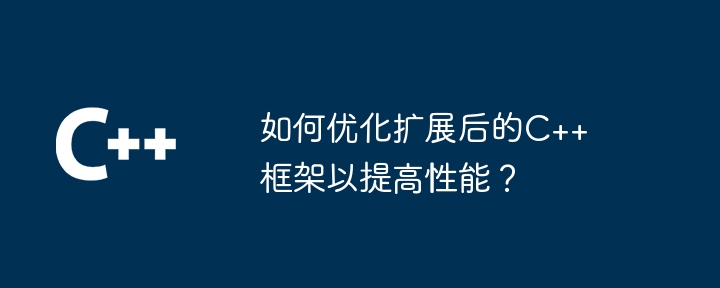在扩展 c++++ 框架时,优化至关重要。技巧包括:1. 剖析性能瓶颈;2. 微优化(避免不必要拷贝、优化内存对齐、内联关键函数);3. 并发编程(使用多线程、原子数据结构);4. 缓存(使用 cpu 缓存、函数内联);5. 代码生成(使用编译器优化、jit 编译);6. 减少内存开销(避免不必要分配、使用轻量级容器)。

如何优化扩展后的 C++ 框架以提高性能
当扩展 C++ 框架时,优化是保持高性能的关键。以下是一些经过实战验证的技巧:
1. 剖析性能瓶颈
立即学习“C++免费学习笔记(深入)”;
代码实战:
#include <gprof.h>
int main() {
gprof_here();
// ... 代码 ...
return 0;
}2. 微优化
代码实战:
struct MyStruct {
int x;
char name[256];
} __attribute__((packed)); // 强制对齐3. 并发编程

具有智能化、高扩展、稳定、安全等特性,并拥有超强功能,可自由添加频道,后台智能修改风格,只要懂得网站常识的站长就可以轻松利用易想多用户商城建立起专业的大型网店,让网友在其中开店卖东西。易想商城有CMS增加频道功能,能够容易的把商城系统扩展成资讯网站多风格自由切换,全站经过专业的优化处理,让你的网站在百度上轻易的就能找到。易想多用户商城为您提供了先进的网友开店交流平台,功能参考了拍拍网、淘宝网、易趣
 0
0

代码实战:
#include <atomic>
std::atomic_int counter;
int main() {
std::thread t1([&] { counter++; });
std::thread t2([&] { counter++; });
t1.join();
t2.join();
std::cout << counter << std::endl; // 输出 2
return 0;
}4. 缓存
代码实战:
int sum_array(int* arr, int len) {
int sum = 0;
for (int i = 0; i < len; i++) {
sum += arr[i];
}
return sum;
}5. 代码生成
代码实战:
// 启用编译器优化
int main() {
return 0;
}6. 减少内存开销
代码实战:
// 使用对象池
struct MyObject {
int data;
};
class ObjectPool {
public:
static MyObject* get() {
if (objects.empty()) {
return new MyObject();
}
auto obj = objects.back();
objects.pop_back();
return obj;
}
static void recycle(MyObject* obj) {
objects.push_back(obj);
}
private:
static std::vector<MyObject*> objects;
};
int main() {
auto obj1 = ObjectPool::get();
// ... 使用 obj1 ...
ObjectPool::recycle(obj1);
return 0;
}以上就是如何优化扩展后的C++框架以提高性能?的详细内容,更多请关注php中文网其它相关文章!

Copyright 2014-2025 https://www.php.cn/ All Rights Reserved | php.cn | 湘ICP备2023035733号